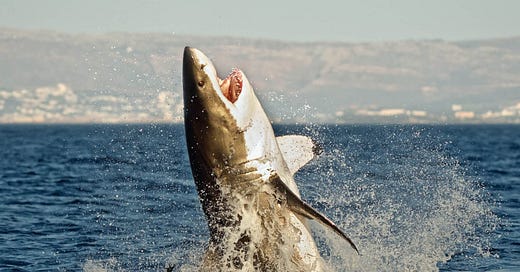The Weekly Bugle: Skin Cancer Vs Shark Attacks
Should the millions being poured into shark mitigation in Australia be directed to skin cancer prevention?
“So you’re a surfer, ever seen any sharks?” It’s a usual question from non-surfers in Europe. The query was posed by a surgeon, as he hacked out two basal cell carcinomas (BCC) from my right forearm. The shark interrogation continued as he scalpeled and then sutured.
Doctor: Seen a shark surfing?
Me: Yep, several. Mainly in West Oz
Doctor: Know anyone that has been bitten?
Me: Yes, a guy we called Pork Chop (before the attack you sickos) lost a leg at my home break. Oh, and my cousin Lisa, who had an artery ripped out of her arm by a great white when she was wakeboarding.
Doctor: How many people die?
Me: About 10 per year, worldwide.
And quoting that number, whilst getting skin cancer, literally, cut out of my arm had me thinking. It came on the back of my lovely mum Viv having just done a month-long painful radiation treatment on her nose for skin cancer. Another less-lovely mate, Dales, had just started the same process on his inner ear.
Later, I told my Dad about the conversation. He replied, “Our Skin Doctor’s group just did a free skin check at the beach. 720 people checked, 30+ possible melanomas were found and eight tested positive to be removed. I still wonder why we spend so much on shark alarms? Now cheer me up.”
His question had me thinking. My parents live in the Hunter Region in NSW, Australia. It has the 8th highest incidence of Melanoma per capita in the world, in the country with the highest. In Oz, it is the most common cancer in the 15-39 age group and one person dies every 5 hours from melanoma.
The skin doctors doing the free checks, via the Hunter Melonama Foundation, were donating their time. The HMF is a charity that relies on raising funds to keep those free checks going. Meanwhile, the NSW government recently announced funding of $85.6 million for the 2022-2026 Shark Management Program with a major focus on surveillance, detection, and deterrents.
Look, I know it’s not a binary choice. And having surfed in Europe for almost two decades, for me the constant threat of sharks has almost dissolved. I haven't been involved in the communities in Ballina, Perth, Foster and Adelaide who have been through the trauma of recent shark fatalities.
Yet it seems hard to justify that level of funding. And NSW surfers, who represented half of all non-fatal shark bite injuries in NSW, tend to agree.
The largest-ever survey of NSW surfers, published in the Australian and New Zealand Journal of Public Health found that while half of surfers in NSW are worried about sharks while surfing, only a very small proportion (16%) are supportive of additional funding for shark detection and management programs. Most were in favour of funding directed at ocean water quality (40%) and drowning prevention (29%). It's worth noting that there have been an average of 43 coastal drowning deaths in NSW per year for the last 10 years. Though very few of those would be surfers.
As the doctor stitched my arm, (he’d moved on conversationally and inevitably to those big waves in Nazare), it seemed as an ageing, white (when a grom surfing Aussie Pipe with my aforementioned mate Dales a local Koori said, “You the whitest bloke I ever seen,”) Aussie, surfer the threat of skin cancer is much more present than a shark attack ever will be. And that goes for most surfers on the planet.
And while this is all back-of-the-fag-packet pseudo-science, surely the funding and resources should reflect that?






Hey Ben, Claudia from the Hunter Melanoma Foundation. Thanks for writing this article and highlighting the work we do at HMF. Such an important topic to discuss - thanks for helping to raise awareness.
Yeah it’s so odd the hold sharks have on the collective imagination when you look at the numbers. I had similar thoughts just before I went to San Francisco to do the Alcatraz swim the other year. Every Brit I mentioned it to said ‘aren’t you scared of sharks??’ (Number of shark bites in the US in 2023 - 36).
I usually (and genuinely) replied ‘nope I’m more worried about being shot’. (Number of firearm deaths in the US in 2023 - 18,874)